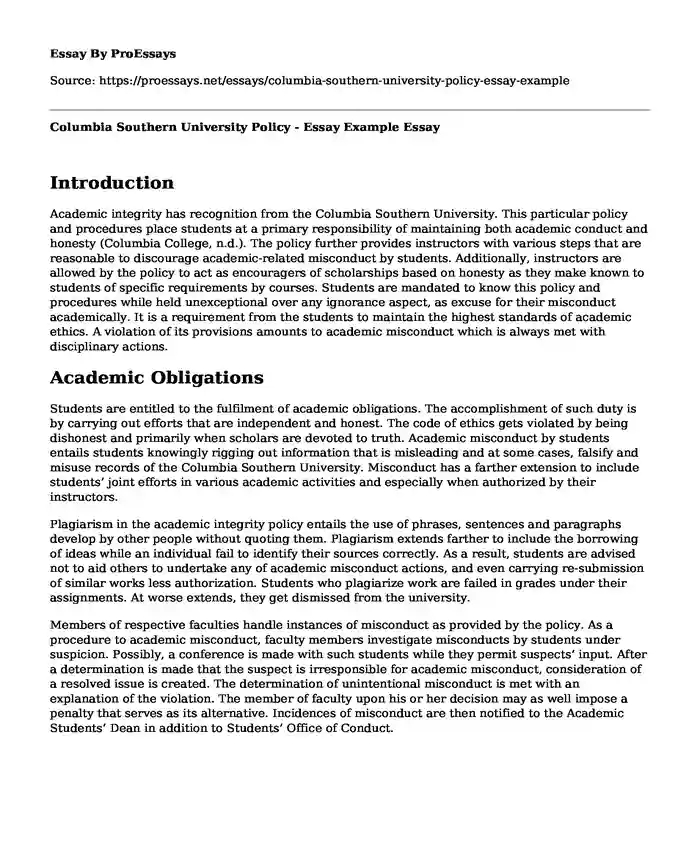Introduction
Academic integrity has recognition from the Columbia Southern University. This particular policy and procedures place students at a primary responsibility of maintaining both academic conduct and honesty (Columbia College, n.d.). The policy further provides instructors with various steps that are reasonable to discourage academic-related misconduct by students. Additionally, instructors are allowed by the policy to act as encouragers of scholarships based on honesty as they make known to students of specific requirements by courses. Students are mandated to know this policy and procedures while held unexceptional over any ignorance aspect, as excuse for their misconduct academically. It is a requirement from the students to maintain the highest standards of academic ethics. A violation of its provisions amounts to academic misconduct which is always met with disciplinary actions.
Academic Obligations
Students are entitled to the fulfilment of academic obligations. The accomplishment of such duty is by carrying out efforts that are independent and honest. The code of ethics gets violated by being dishonest and primarily when scholars are devoted to truth. Academic misconduct by students entails students knowingly rigging out information that is misleading and at some cases, falsify and misuse records of the Columbia Southern University. Misconduct has a farther extension to include students’ joint efforts in various academic activities and especially when authorized by their instructors.
Plagiarism in the academic integrity policy entails the use of phrases, sentences and paragraphs develop by other people without quoting them. Plagiarism extends farther to include the borrowing of ideas while an individual fail to identify their sources correctly. As a result, students are advised not to aid others to undertake any of academic misconduct actions, and even carrying re-submission of similar works less authorization. Students who plagiarize work are failed in grades under their assignments. At worse extends, they get dismissed from the university.
Members of respective faculties handle instances of misconduct as provided by the policy. As a procedure to academic misconduct, faculty members investigate misconducts by students under suspicion. Possibly, a conference is made with such students while they permit suspects’ input. After a determination is made that the suspect is irresponsible for academic misconduct, consideration of a resolved issue is created. The determination of unintentional misconduct is met with an explanation of the violation. The member of faculty upon his or her decision may as well impose a penalty that serves as its alternative. Incidences of misconduct are then notified to the Academic Students’ Dean in addition to Students’ Office of Conduct.
Conclusion
Stated syllabus penalties are administered to students who admits commission of this specific misconduct such as a ‘Fail’ in the particular course of misconduct. For more serious offences, a student receives a written notification that reveals the decision of the faculty member. Actions taken are made in writing to notify the Academic Dean in-charge of students, who later pursue consequences of misconduct based on individual behaviour. In his or her referral, students’ matters are presented in Students’ Office of Conduct for adjudication. If dissatisfied by the results, students appeal misconduct cases, but would first consult the chairperson of their department.
Reference
Columbia College. (n.d.). Academic Integrity Policy and Procedures.
https://www.ccis.edu/policies/academic-integrity-policy-and-procedures.aspx.
Cite this page
Columbia Southern University Policy - Essay Example. (2023, Nov 25). Retrieved from https://proessays.net/essays/columbia-southern-university-policy-essay-example
If you are the original author of this essay and no longer wish to have it published on the ProEssays website, please click below to request its removal:
- Alternate Observation in Authentic Learning
- Workers in the Cane Essay
- Children of Divorce Are Delayed in Many Aspects: Research Paper
- Essay Sample on Children Development
- Speech Example: Depression in Students
- Essay Sample on Criteria for Selecting Early Childhood Development Center
- Admission Essay Sample on MBA Course in Robotics & Automation







